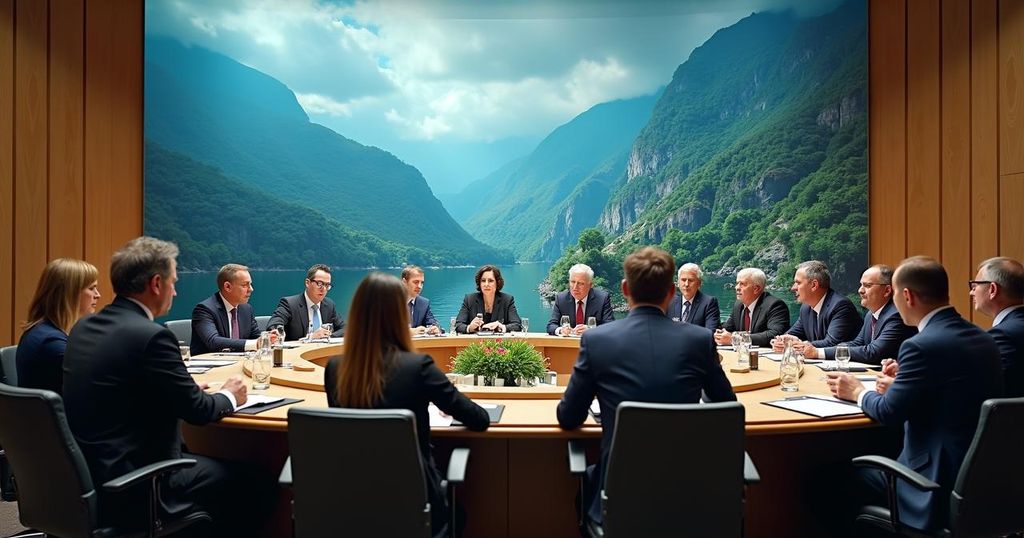Leaders Highlight Climate Finance Needs Ahead of COP29 Summit
Leaders preparing for COP29 in Azerbaijan emphasize the need for climate finance that could reach ‘hundreds of billions’ in light of the trillions necessary to address climate impacts. As the annual summation of $100 billion for developing countries is re-evaluated, the urgency for collaboration and financial support is underscored amid deteriorating climate conditions and rising global temperatures.
In anticipation of the upcoming COP29 United Nations climate summit in Azerbaijan, leaders highlighted the necessity for substantial financial resources to combat climate change, acknowledging a staggering requirement of trillions of dollars. However, as negotiators prepare to convene in Baku next month, they assert that a feasible consensus can realistically target financing in the ‘hundreds of billions’ range, rather than the astronomical figures that are truly needed. The summit is set to reevaluate the existing commitment of wealthy nations to allocate $100 billion annually to support developing countries in their climate adaptation and mitigation efforts. Yalchin Rafiyev, the chief negotiator for the COP29 presidency, remarked that while recognizing the trillions needed, realistic funding from the public sector may only materialize in the ‘hundreds of billions’. The urgency for increased financial support stems from the escalating impacts of climate change, which have intensified natural disasters and adverse weather events. Developing nations, particularly vulnerable to these changes, are advocating for enhanced financial resources to invest in renewable energy initiatives and to adapt to the detrimental effects of global warming Recent assessments indicate that global temperatures have risen approximately 1.3 degrees Celsius (2.3 degrees Fahrenheit) above pre-industrial levels, with projections suggesting 2024 may become the hottest year recorded. Scientists warn that achieving the critical target of limiting temperature rise to 1.5 degrees Celsius (2.7 degrees Fahrenheit) necessitates immediate and intensified efforts. The forthcoming conference expects attendance from over 100 world leaders, including 61 presidents and 38 prime ministers as of mid-October. In contrast, the previous climate summit in Dubai featured more than 160 global leaders. Mukhtar Babayev, the COP29 President-Designate, expressed optimism about narrowing options for consensus, stating that “we can clearly see the divides that the Parties still need to bridge”. Azerbaijani President Ilham Aliyev emphasized the need for unity, imploring states to “put aside disagreements, stop blaming each other and find common ground,” stressing that procrastination in attributing blame could hinder progress against climate change.
The discussions surrounding climate change finance are pivotal as nations grapple with the need for immediate action to combat the devastating effects of climate change across the globe. Wealthier nations currently maintain a promise to provide $100 billion per year to less developed countries, a commitment that is being carefully reassessed as global leaders prepare for COP29. The urgency is underscored by the scientific consensus that failing to limit the rise in global temperatures could lead to catastrophic impacts, thereby necessitating increased investments in climate change mitigation and adaptation strategies. The upcoming summit in Baku is significant not only for its negotiation of these financial commitments but also for fostering international collaboration amidst ongoing climate emergencies.
In summary, the approaching COP29 climate summit in Azerbaijan underscores the urgent need for enhanced climate finance, with leaders expressing a realistic aim of securing ‘hundreds of billions’ in funding. As developing nations advocate for substantial investments to combat the impacts of climate change, the ongoing discussions reflect a growing recognition of the trillions required to effectively address this global crisis. Enhanced collaboration and consensus-building among nations will be crucial in addressing the financial disparities and fostering an effective global response to climate change challenges.
Original Source: wtvbam.com




Post Comment